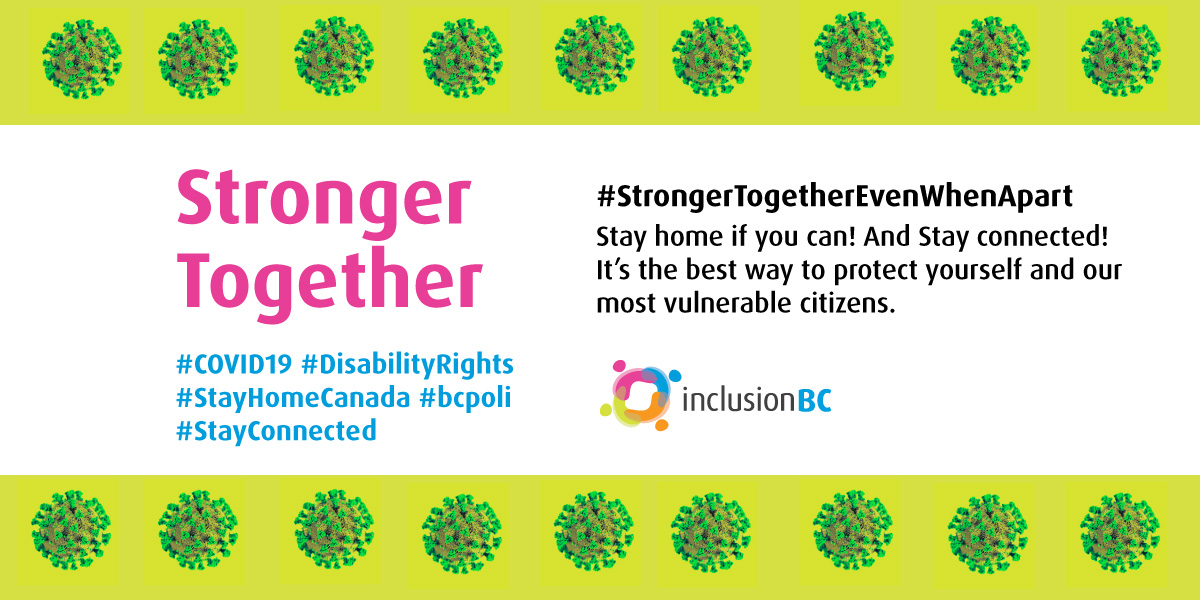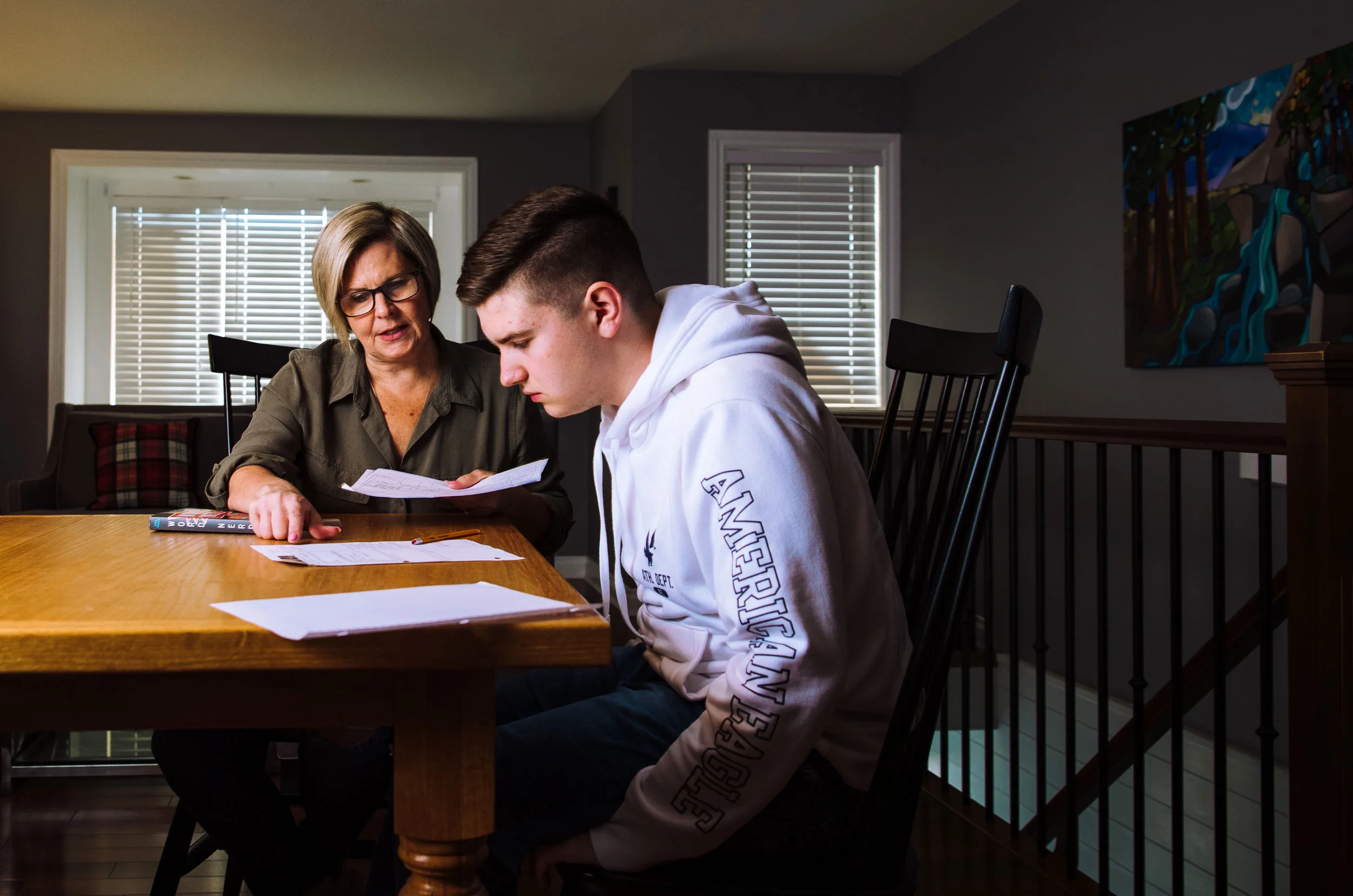We’re Stronger Together
A progress report – March 31, 2020
The pandemic is presenting unique challenges for people with disabilities and their families.
The pandemic has been challenging for everyone, and it is presenting unique challenges for people with disabilities and their families.
I am hopeful we can work together to make things better.
There are still unanswered questions, but our leaders have stepped up on many fronts.
First of all, the very important role of the community living sector needed to be recognized and secured. We’d like to thank the BC government deeming our sector’s work as an “essential service”. This is just one of the important changes so far stemming from our advocacy and everyone’s collaborative work. Other important initiatives to ensure everyone’s safety and wellbeing are still being worked out and we will share details as they’re put in place.
A huge thank you to our member organizations for their incredible work and their strong commitment to the people they support. It is my privilege to take this journey with you.
We asked CLBC to extend the flexibility of services to meet people’s needs in a safe and secure way. We recognize that these first steps may not be meeting everyone’s needs. We encourage you to reach out to our Advocacy Line if you need additional support.
In the coming weeks, we will continue working closely with CLBC and we also look forward to working with the Ministry of Education and the Ministry of Children and Family Development to provide those same types of flexible supports for students and families in the coming weeks.
Immediate financial relief is now needed for people and their families. Both the federal and provincial governments have promised that this is coming. Inclusion BC will keep pressing until there is clarity that people will get the financial support they need.
Most importantly, I want to say that I am inspired by the way people are stepping up to help each other. The natural supports provided by parents, siblings, friends, and neighbours. This is what is really making a difference for people.
If you find yourself struggling, we encourage you to reach out to our advocacy line. Call toll-free: 1-844-488-4321 or email: advocacy@inclusionbc.org
Inclusion BC is here for you — as an advocate, ally and friend to ensure no one is left behind.
Stay well!
Karla Verschoor
Executive Director
Inclusion BC

Progress Report: Stronger Together
We are working collaboratively with our community partners to urge governments, agencies, businesses, non-profits, and community groups to accommodate the unique needs of people with intellectual disabilities and their families through the COVID-19 pandemic.
Here is an update on the measures we have proposed with our partners.
Accessibility & Inclusion
Explicit consideration of the unique needs of individuals with intellectual disabilities in all COVID-19 planning and response, including communication barriers and accessibility of emergency measures intended to help all Canadians, as recommended by the World Health Organization (WHO).
- In Progress: Inclusion BC, Disability Alliance BC & others working with provincial officials to ensure a disability lens is included in all COVID-19 planning and responses. We are also working with provincial and national partners to ensure explicit medical ethics guidance is NOT discriminating against people with intellectual disabilities who need medical services and ICU care.
- Next steps: The next steps include outreach to business and community partners to help engage them in promoting a disability lens in all community disaster planning.
BC’s Centre for Disease Control’s COVID19 resources should explicitly include people with intellectual disabilities in its list of vulnerable populations.
- In Progress: Still not explicitly listed although Dr. Henry has issued some explicit messaging to ensure that people with disabilities are considered as a vulnerable population.
- BC CDC Vulnerable populations: Information for people living with health conditions.
All COVID-19 public health messaging should include plain-language versions.
- In Progress: Community partners have stepped up with lots of COVID-19 resources in plain-language, but this still needs to be formally part of the official federal and provincial messaging.
- CLBC has established special COVID-19 info pages
- For individuals & families: Novel Coronavirus (COVID-19)
- For service providers: Novel Coronavirus (COVID-19) for service providers.
- Next steps: We’ve suggested the need for those supporting this community to coordinate efforts to establish central, curated repositories of useful resources for people with intellectual disabilities, families & agencies.
Specialized BC Helpline with the expertise to answer questions and provide supports addressing the specific needs of people with intellectual disabilities and their families.
- In Progress: BC211 line helping connect volunteers with seniors and people with disabilities. Inclusion BC’s Advocacy line/staff also available and other advocacy groups have stepped up to serve their communities. Ottawa has announced extra support for crisis lines serving children & vulnerable women.
- Next steps: More formal province-wide helpline services for people with disabilities and their families.
- Next steps: A provincial resource centre for school-age children with disabilities/diverse learning needs will be a key focus as BC educators return from spring break.
Emergency supports
Emergency supports to ensure security for individuals and extra support for family caregivers who have to step in to replace cancelled school and community programs.
Use emergency federal funding to support family caregivers who need to fill in for cancelled school and community support programs or to comply with public health policies intended to minimize risks of infection and transmission.
- In Progress: It’s not clear how federal money can do this. Are others going to fund? It is still unclear how it will apply in this context.
Avoid any interruption to Persons With Disabilities (PWD) monthly payments. Suspend all administrative holds, e.g. due to paperwork errors or potential eligibility for federal EI or emergency benefit payments.
- In Progress: Inclusion BC and other advocacy groups have sent strong, clear & unequivocal messages provincially and nationally on the need to protect and enhance income security for all vulnerable citizens during the crisis. Governments are working on this but results are still pending.
For families of school-age children and youth with extra support needs, additional supports are urgently needed for critical home and nursing care, medical supplies, mental health, trauma, and family violence supports. (See BCEdAccess Recommendations)
- In Progress: Access to medical supplies/equipment is a broader challenge that governments are working on as a top priority.
- Next steps: We will continue to ensure the needs of at-home and community caregivers are also prioritized as solutions unfold.
- In Progress: Federal support announced for mental health, trauma and violence prevention services.
Community supports
Help agencies that deliver community support programs maintain and adapt their services to changing needs while ensuring the safety of staff, individuals and families whom they support.
Designate staff who deliver critical Community Living BC and MCFD support programs for people with intellectual disabilities and their families as essential services workers.
- Yes! The provincial government heard and responded to this urgent call. Thank you, BC!
Work with agencies and employee groups to allow temporary flexibility to reassign staff to meet urgent needs while keeping everyone safe as those change and evolve.
- In Progress: Inclusion BC & member agencies continue to work with government, staff/unions and each other to help advance solutions.
Social connectedness
Provide emergency technology funding to help community service agencies adapt to work-from-home and at-home service delivery policies.
Funding for computer tablets and Internet service to permit people with intellectual disabilities to access supports and services remotely where possible.
- Yes! Telus announced 2 months of free Internet for all low-income subscribers.
- Yes! Members and community partners like PLAN, VELA and others have stepped up to help keep families, adults and care providers connected and supported as they adjust to coping with COVID-19 measures.
- Next steps: We continue to encourage everyone to do their part by reaching out and connecting virtually using all the wonderful technology that is helping us stay social and #StayConnected during these difficult times.
- In Progress: Inclusion BC is working with SET-BC & Education Ministry on prioritizing access to technology for families of school-age children who don’t have access or can’t afford this technology at this time.
- Next steps: Sourcing funding for tablets for adults with intellectual disabilities


